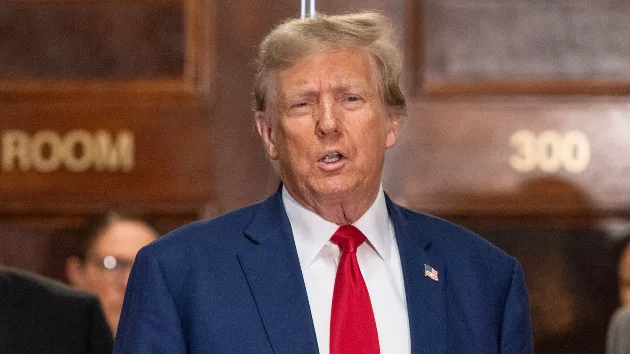Former President Donald Trump is asking the Supreme Court to extend the delay in his election interference trial, saying he is immune from prosecution on charges he plotted to overturn his 2020 election loss.
His lawyers filed an emergency appeal with the court on Monday, just four days after the justices heard Trump’s separate appeal to remain on the presidential ballot despite attempts to kick him off because of his efforts following his election loss in 2020.
The filing keeps on hold what would be a landmark criminal trial of a former president while the nation’s highest court decides what to do. It met a deadline to ask the justices to intervene that the federal appeals court in Washington set when it rejected Trump’s immunity claims and ruled the trial could proceed.
The Supreme Court’s decision on what to do, and how quickly it acts, could determine whether the Republican presidential primary frontrunner stands trial in the case before the November.
Former President Donald Trump faces a Monday deadline for asking the Supreme Court to extend the delay in his trial on charges he plotted to overturn his 2020 election loss.
His lawyers have indicated they will file an emergency appeal with the court, just four days after the justices heard Trump’s separate appeal to remain on the presidential ballot despite attempts to kick him off because of his efforts following his election loss in 2020.
The filing would preserve a delay on what would be a landmark criminal trial of a former president while the nation’s highest court decides what to do. The federal appeals court in Washington set the deadline for filing when it rejected Trump’s immunity claims last week and ruled the trial could proceed.
The Supreme Court’s decision on what to do, and how quickly it acts, could determine whether the Republican presidential primary front-runner stands trial in the case before the November election.
There is no timetable for the court to act, but special counsel Jack Smith’s team has strongly pushed for the trial to take place this year. Trump, meanwhile, has repeatedly sought to delay the case. If Trump were to defeat President Joe Biden, he could potentially try to use his position as head of the executive branch to order a new attorney general to dismiss the federal cases he faces or even seek a pardon for himself.
The Supreme Court’s options include rejecting the emergency appeal, which would enable U.S. District Judge Tanya Chutkan to restart the trial proceedings in Washington’s federal court. The trial was initially scheduled to begin in early March.
The court also could extend the delay while it hears arguments on the immunity issue. In that event, the schedule the justices might set could determine how soon a trial might begin, if indeed they agree with lower court rulings that Trump is not immune from prosecution.
In December, Smith and his team had urged the justices to take up and decide the immunity issue, even before the appeals court weighed in. “It is of imperative public importance that Respondent’s claim of immunity be resolved by this Court and that Respondent’s trial proceed as promptly as possible if his claim of immunity is rejected,” prosecutors wrote in December.
Trump’s legal team has ascribed partisan motives to the prosecution’s push for a prompt trial, writing in December that it “reflects the evident desire to schedule President Trump’s potential trial during the summer of 2024—at the height of the election season.”
Now it’s up to a court on which three justices, Amy Coney Barrett, Neil Gorsuch and Brett Kavanaugh, were appointed by Trump when he was president. They have moved the court to the right in major decisions that overturned abortion rights, expanded gun rights and ended affirmative action in college admissions.
But the Supreme Court hasn’t been especially friendly to Trump on legal matters directly concerning the former president. The court declined to take up several appeals filed by Trump and his allies related to the 2020 election. It also refused to prevent tax files and other documents from being turned over to congressional committees and prosecutors in New York.
Last week, however, the justices did seem likely to end the efforts to prevent Trump from being on the 2024 ballot. A decision in that case could come any time.


Comments are closed